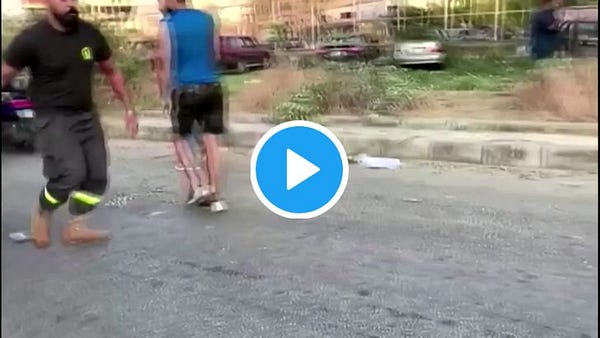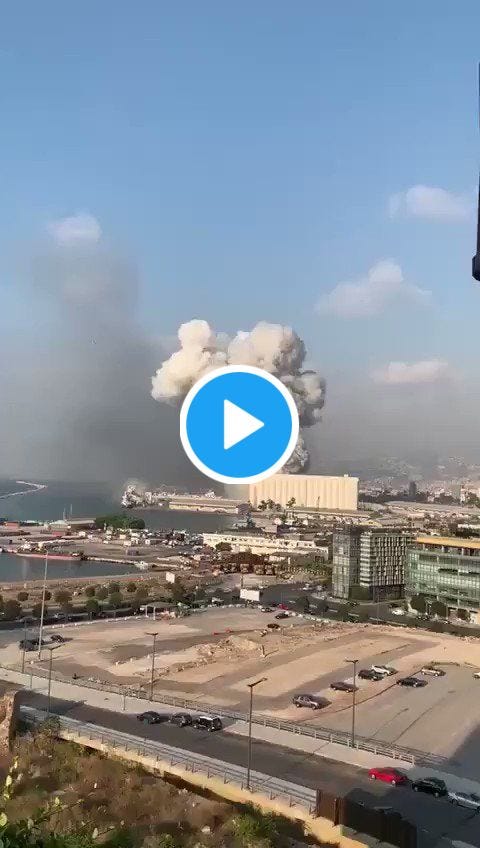🇱🇧Beirut Blast: What We Know So Far
Hello and welcome to another edition of Inside The Newsroom where today we’ll dissect what we know from yesterday’s devastating explosion in Lebanon’s capital of Beirut. As of 7am EST/12pm BST, at least 100 people have been killed and more than 4,000 injured, according to the Lebanese Red Cross. Before we get into it, I wanted to say a quick thanks to those who sent me an email regarding yesterday’s announcement, I was taken back by the reception. 🙏
What We Know
At around 6:00pm local time, reports of a fire and fireworks exploding at a warehouse by Beirut’s port began to surface. Prime minister Hassan Diab has since confirmed that the source of the ensuing explosion was 2,750 tonnes of ammonium nitrate, which had been unsafely stored in the warehouse for six years, and the initial blaze is now thought to have been down to “negligence”. The blast was heard as far as Cyprus 150 miles away. Warning: The below videos are pretty damn distressing and left large parts of the city unrecognizable…




While the world awaits more information, PM Diab promised “those responsible for this catastrophe will pay the price”. It remains unclear whether yesterday’s events are linked to the U.N.-backed trial of four suspects from Hezbollah — the Shia Muslim political party backed by Iran and Syria, and widely recognized by the West as a terrorist organization — over the 2005 assassination of former prime minister Rafik Hariri. Hariri is widely credited with getting Lebanon backed on its feet after the bloody 15-year civil war between 1975 and 1990. Hezbollah, or an accident, might yet end up being responsible for the blast, but despite not having have any concrete evidence, Donald Trump couldn’t help himself by immediately saying the blast looked like an attack.
As we’ve discussed in this newsletter in the past, a disaster like this naturally unites people. So it was nice to see the international outpouring of grief and support by many countries, with a selection below including by Israel, whose been at violent odds with Lebanon for several decades…




Who Are Hezbollah?
Hezbollah, or the Party of God, rose to prominence in the early 1980s amid Israel’s occupation of Lebanon following the assassination of Israel’s ambassador to Britain, Shlomo Argov. After Israel retreated from southern Lebanon in 2000, largely due to Hezbollah’s robust resistance, the group’s power and influence over Lebanon grew astronomically. Hezbollah is now arguably stronger than the Lebanese government’s army, partly due to its backing from Iran and Syria, and its popularity among the Shia community.
The situation between Hezbollah and Israel is no better today and tensions are simmering. I got a glimpse of this first hand when I visited the region last year, where Hezbollah flags line the border giving a truly chilling feel. The Israel Defence Forces launched air raids near the occupied Golan Heights along its border with southern Syria on Monday, after it claimed Hezbollah militants attempted to lay explosives in the area. That comes a little more than a week after Israel killed another group of foreign fighters near Syria’s Damascus International Airport.
Covid-19 and Economic Woes
There’s obviously no appropriate time for any explosion, but Lebanon’s deteriorating Covid-19 case count and fragile economic woes mean yesterday’s news couldn’t have come at a worse time. The country has seen record daily cases for most of the past two months and show no signs of slowing, and increased deaths linked to the disease are also increasing. Perhaps a small silver lining is the fact that strict lockdown measures imposed last week coincided with the end of the Eid al-Adha holiday on Monday, which likely meant less people were on the streets at the time of the blast.
Source: Worldmeters

On top of the Covid situation, Lebanon’s economy is facing complete collapse. Since 1997, the Lebanese Central Bank artificially pegged the Lebanese Pound to the U.S. dollar, and the government was able to maintain economic stability from borrowing vast amounts from private banks. But in 2013, Lebanon’s GDP growth began to stall due to uncertainty from conflict in neighbouring Syria, and declined in 2018 for the first time since 1999, according to the World Bank. Now only select people are able to receive the ~1.50 USD exchange rate, and The Guardian’s Martin Chulov provides excellent context on the Today In Focus podcast.
Source: World Bank






